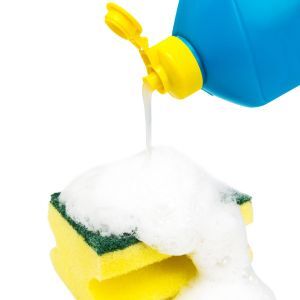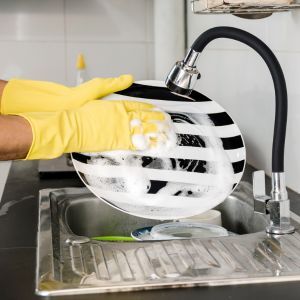Do Thicker Dishwashing Liquids Actually Clean Better?
When choosing dishwashing detergent for a commercial kitchen, it’s tempting to equate thickness with cleaning strength. A thicker product feels more concentrated, more robust – but does that actually mean it performs better? In this article, we explore the science behind viscosity in detergents, debunk common myths, and help you choose the right product for your business.
The Viscosity Myth: Why Thickness Seems More Effective
Thicker dishwashing liquids are often perceived as more effective because they feel richer and stick better to surfaces. This can make them seem more powerful, but thickness is not directly correlated with cleaning performance.
Viscosity in detergents is often achieved through thickening agents, which do not improve cleaning power. In fact, a thicker detergent may be less efficient in automatic or high-speed applications where rapid rinsing is required.
What Actually Determines Cleaning Power?
Cleaning effectiveness is driven by a detergent's formulation, specifically:
-
Surfactant concentration: These break down grease and food particles.
-
pH levels: High or low pH can aid in lifting organic matter or sanitising surfaces.
-
Enzymes or solvents: Some detergents include specialised agents for breaking down starches, proteins, or fats.
Whether thick or runny, the best dishwashing detergent is one that matches your cleaning needs, equipment setup, and staff usage patterns.
Pros and Cons of Thicker Dishwashing Liquids
Pros:
-
Better cling: Ideal for hand-washing or scrubbing greasy pots and pans.
-
Perceived quality: Many staff members feel thicker products last longer or clean better.
-
Controlled application: Reduced spillage and waste in manual use.
Cons:
-
Slower rinse: May leave residues in fast-paced systems.
-
Risk of overuse: Staff may use more product due to perceived need.
-
May not suit dispensers: Could clog systems designed for low-viscosity fluids.
What About Eco-Friendly Thick Detergents?
Some thick dishwashing liquids also carry eco-friendly credentials. These typically use plant-based thickening agents and avoid harsh chemicals. However, eco-friendliness should be verified by certifications such as Environmental Choice NZ or other recognised sustainability labels.
When to Choose a Thicker Dishwashing Detergent
Opt for a thick detergent if your staff frequently clean by hand, especially when tackling heavily soiled cookware. However, if you rely on high-speed operations, a lower-viscosity detergent may offer better efficiency.
You can also read our related article: Thick vs Runny Dishwashing Liquid: Which Works Best in Commercial Settings?.
Frequently Asked Questions (FAQ)
Does thicker detergent mean better cleaning?
No. Cleaning ability depends on the formulation, not the viscosity. A runny detergent can clean just as effectively as a thick one.
Is thickness an indicator of concentration?
Not always. Some thick detergents are highly concentrated, but others simply use additives to alter texture without improving cleaning power.
Can thick dishwashing liquids be eco-friendly?
Yes. Look for products with verified eco-labels and plant-based ingredients.
What Insinc Recommends
At Insinc, we offer both thick and thin dishwashing detergents, each suited to different commercial uses. Whether you're scrubbing trays by hand or running high-volume dishwashers, we can supply a product that matches your cleaning needs while supporting sustainable business practices.
Conclusion
Thickness is not a guarantee of cleaning power. While thicker dishwashing liquids offer advantages in certain applications, it's the formulation that determines real performance. Choose based on your kitchen's workflow and trust Insinc to help you make the right decision for safety, cost, and sustainability.
Posted: Friday 29 August 2025


